When do babies start saying mama? “Mama” and “dada” are often the baby’s first words, but when can you expect your child to say them correctly? It’s exciting when your baby starts babbling because it means your child is one step closer to talking! Of course, you and your partner are racing to see which word baby says first: “mama” or “dada.” However, it is unlikely that a baby will begin saying either word immediately after making noises.
It’s an absolute joy for parents to hear their babies say their first words! Before babies start talking, they become acquainted with various sounds such as babbling and cooing. Most babies can do it by three months of age. Every baby, however, is unique and develops at its own pace. As a result, the timing of when they say “mama” or “dada” may differ.
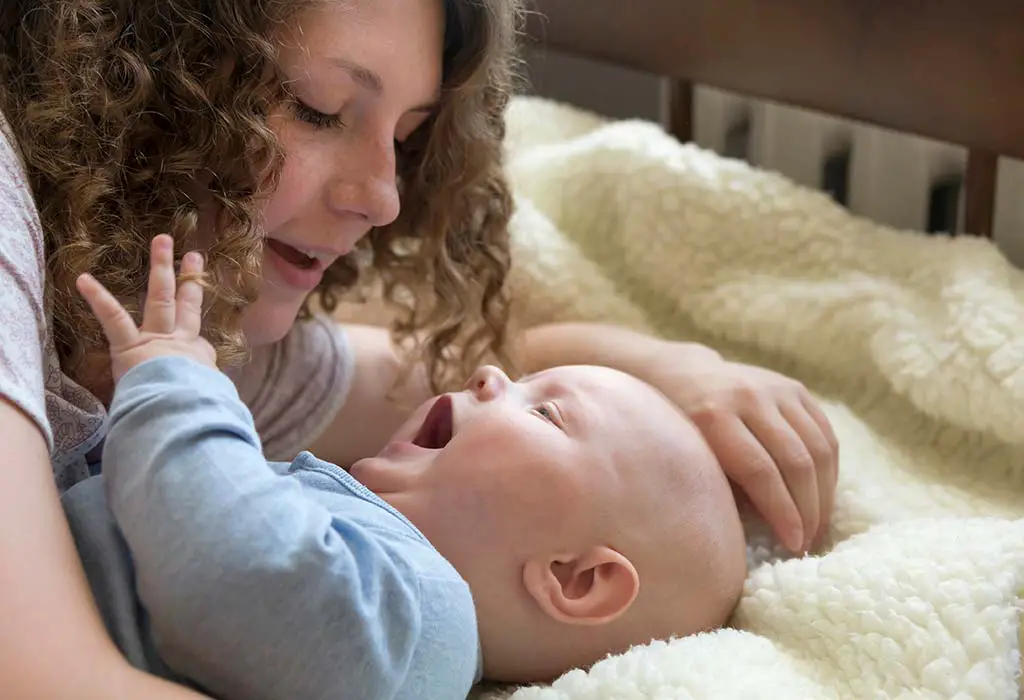
Nevertheless, the question- when do babies start saying mama? May arise in the minds of many parents. To learn more about it, we recommend reading till the end!
When do babies start saying mama? At what age?
When do babies start saying mama? At what age? We all know that different babies reach different milestones at different times; the same is true in this case. However, your munchkin may begin making sounds like ‘mamamama’ or ‘dadadada’ around seven months of age, but these are more babbling sounds than actual words. Your baby may begin to say the actual words around nine months.
Which will your baby say first, “Mama” or “Dada”?
When do babies start saying mama? Which will your baby say first, “Mama” or “Dada”?
While you may want your baby to say ‘Mama’ first, your partner may secretly want your baby to say ‘Dada’ first. People frequently assume that a baby’s first word will be ‘dada’ because the ‘da’ sound is easier to make than the ‘ma’ sound. Nevertheless, this is not constantly the case; some babies may be more interested in saying the’ ma’ sound.
So, the likelihood of your baby saying ‘dada’ or ‘mama’ depends on which sound the baby latches on to; for example, if the baby latches on to ‘da,’ he may say ‘dada’ first, and vice versa. Furthermore, the primary caregiver may have an advantage over the other, which means that if the mother spends more time with the baby, the baby may say mama first, which is why most babies say, mama!
Do Babies mean ‘Mama’ and ‘Dada’ when they say, Mama?
When do babies start saying mama? Do Babies mean ‘Mama’ and ‘Dada’ when they say, Mama? Though your baby may begin babbling words as early as seven months, he may be saying actual words by nine months or later. However, most parents may wonder whether or not their child truly believes what he says. Before one year, babies are unlikely to understand or connect with what they say. So, as parents, keep an eye out for when your child begins to make sense of words!
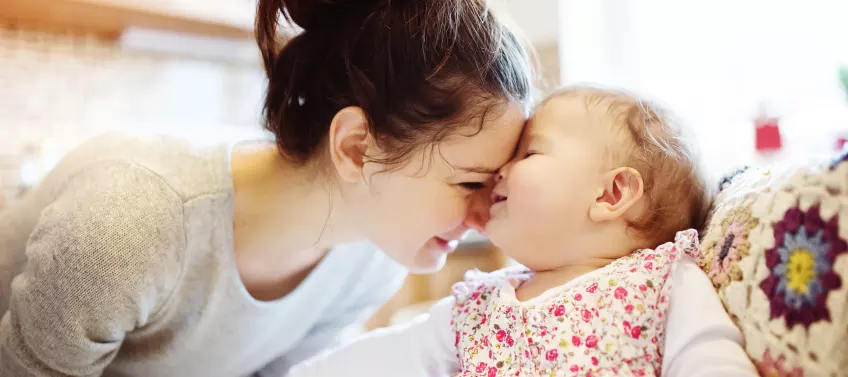
Tips to Make Babies Say ‘Mama’
Each baby is unique, and he or she may reach the milestone at a slightly different age. Nonetheless, you can try various activities and exercises to assist the baby in reaching this speech milestone. If you believe your baby’s language skills are not developing as expected, there are some tips to help your baby develop good language skills.
The following are some methods for gradually encouraging the baby to say Mama by improving his or her language and communication skills.
- Utilize Your Senses
Repeating ‘mama’ or ‘dada’ over and over is one of the most effective ways to get your baby to say these words. Placing your baby’s hand over your mouth as you say ‘ma’ may help you get the feel of the word. This exercise is excellent for stimulating your baby’s auditory, visual, and tactile skills.
- Read to the child
Sit with your infant and read a children’s book aloud. Make a point of pointing at different pictures and naming them. When you read the same book again, point to a picture and ask the baby to name it. This activity helps the baby learn and remember the names of various items or objects, laying the groundwork for using words like “Mama” and “Dada.”
- Talk to Your Child
Parents may prefer babbling with their baby instead of talking with them because they think it’s cute, or they may pretend to converse in baby language. While doing so occasionally can be adorable, doing so regularly may not benefit your baby’s language skills. Instead, talk to your baby about things around you, your day, what he is doing, etc., or simply sing or point and say the names of objects, and the baby will soon start saying momma or dada as well!
- Photo Album for ‘Mama’ or ‘Dada’
Make a photo album with ‘Mama’ or ‘Dada’ pictures, and show the album to the baby while repeating the ‘Mama’ word. You can do this for each picture in the album, pointing to the picture and yourself as you go. Several repetitions may help your baby understand and associate the word with you. You can do the same exercise for ‘Dada.’
- The Game of Peek-a-Boo
Most parents play peek-a-boo games with their newborns, and this fun game is also a great way to teach a baby the words ‘Mama’ or ‘Papa.’ You can hide behind a door, behind a curtain, or simply under a blanket, and every time you come out, you can say ‘Mama.’ Do this a few times a day, and your baby may start saying ‘Mama’ when you pop out instead of you!
- Take Note of What Your Baby Says
Your baby babbles, but he communicates with you in his or her language. You should not ignore what your baby is trying to communicate, and you will soon notice your munchkin making all the sense and saying the long-awaited words that may be the sweetest sounding words ever, ‘Mama’ and ‘Dada.’
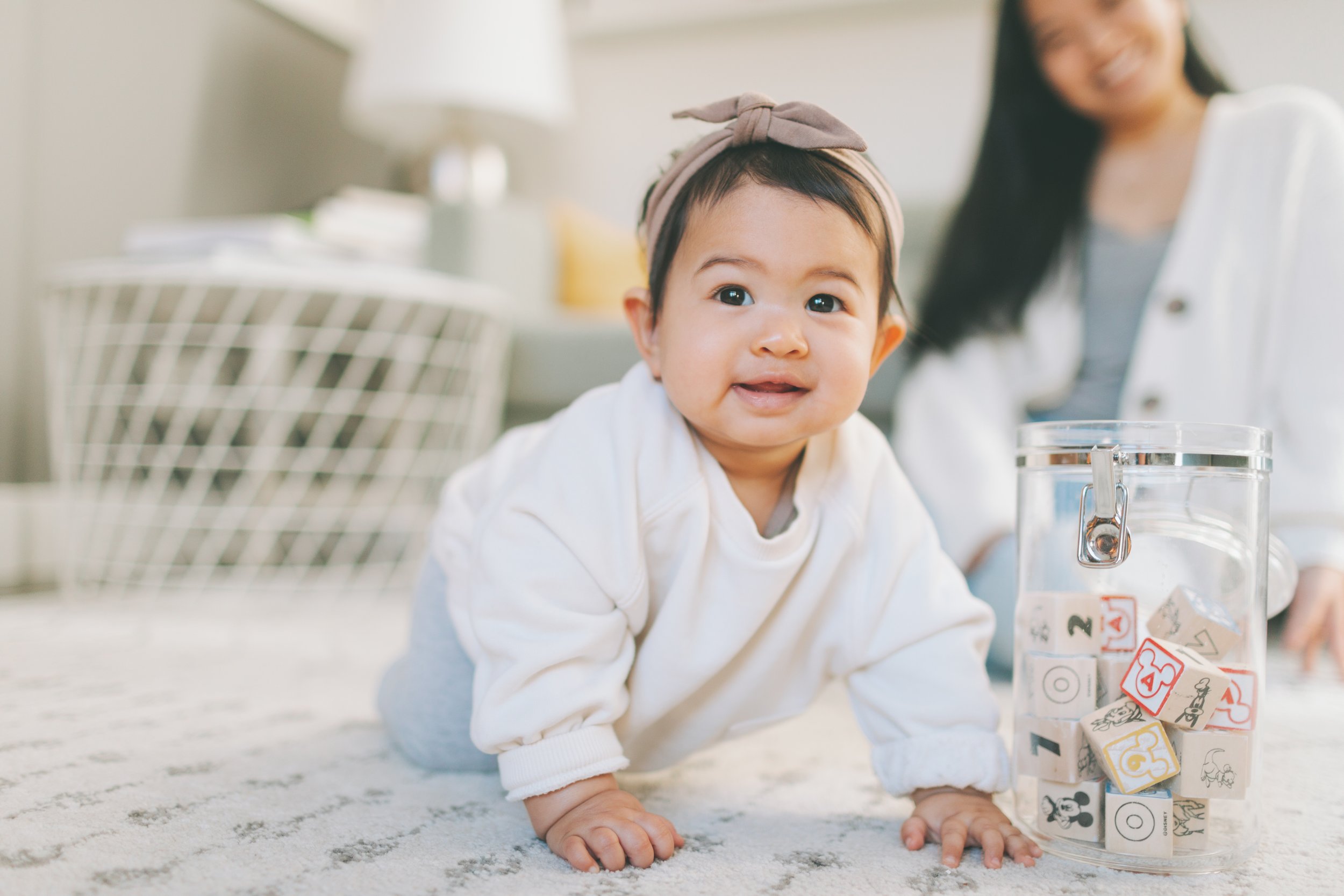
- Sing nursery rhymes and songs
Nursery rhymes and songs assist babies and toddlers in developing their language skills. The musical nature of rhymes and songs may also help toddlers memorize new words and understand their meanings. You can choose from various classic nursery rhymes or write your songs that include the words “Mama” and “Dada” in the lyrics.
- Teach the names of things and people
One of the adequate ways to teach your baby’s name and other proper nouns is to point to an object and name it. Point to a toy and say its name while playing with the baby. When your pet passes by, call it by its name. As the baby grows older, you can refer to a parent by saying things like, “Where is Dada?” and “Look, it’s Mama.” The baby will slowly learn to associate the sound with that person and realize it is used to refer to that person.
- Start responding
By six months, infants begin to respond to sounds by making sounds. By eight to nine months, they may even respond to their name. Use this achievement to conversely teach words and nouns. Ask your baby questions and wait for a response. Respond to their responses, even if they are coos and gurgles. Babies detect responses are more likely to initiate conversations with their parents.
- Recognize accomplishments
When your child learns to say “Mama” and “Dada” correctly, appreciate and praise them. Respond quickly and positively whenever they call you “Mama” or refer to their father as “Dada.” Constant praise in words and cuddles is an excellent way to help babies develop their speech and language skills.
When do babies start talking?
You’ll notice your baby has a way of communicating with you immediately, whether through hungry or tired cries, and you’ll soon be able to tell the difference.
It’s unlikely that your baby will say anything after their first vocalizations, but this begs the question, when can you expect to hear their first word?
First and foremost, it is critical to define what a word is. Babies begin babbling and experimenting with language around six months, and their noises may show significant development.
During this time, they are learning a new instrument and their vocal cords and are beginning to understand more and more of what you are saying. This means they understand, even if they are unable to communicate. However, while these vocalizations may sound like words, they are too young to be classified as using a word at this stage.
These babbling noises may begin to change around 9 months. They may begin to incorporate new sounds, such as “babadadama.” They have advanced to the point where they can understand more of what you are saying and even their name, but they still lack the complete motor skills and coordination required for speech.
You can hope to hear your baby’s first words around 12 months. Some children may experience it sooner, while others may experience it later than their first year of life. Early words your baby will say include “mama” or “dada,” “bye-bye,” “milk,” “juice,” or “doggy.”
Don’t be concerned if they don’t say the word clearly in their first year of life. Between now and 18 months, many things may be called by the same word, and a ball may be many things! They will consistently be watching and imitating you, so make sure they can see your mouth clearly to help them develop.
They will continue to improve their speech and language skills until they are about 18 months old, when a vocabulary explosion occurs. They may begin to join words together by the age of 24 months. Many of their words will be much clearer by now. However, this will be ironed out over the next few years.
If you notice that a particular early speech sound is persistently difficult (some sounds are expected before others), or if your child grimaces when saying words, you should consult a medical professional.
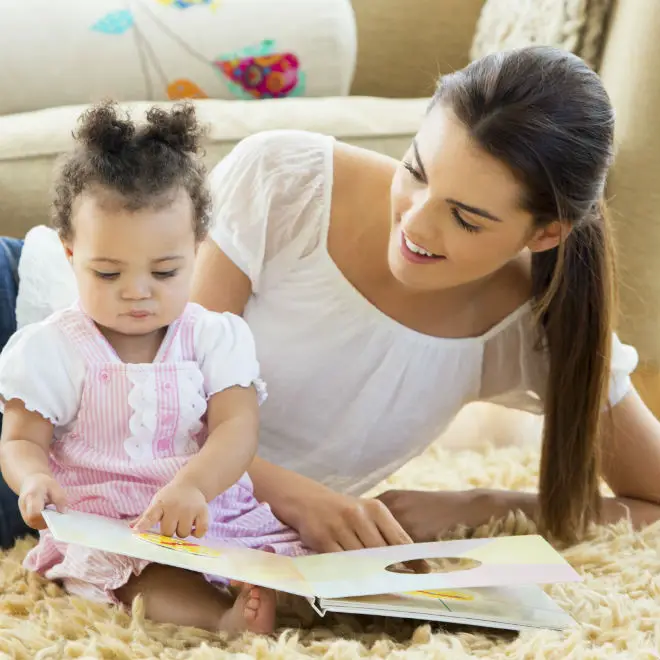
Also Read: How To Put On Owlet Sock- 3 Important Benefits With Steps!
When should I worry if my child isn’t talking?
All parents must consider the bigger picture of their child here: the overall picture of your baby’s communication. Understanding words and your baby’s social skills are important building blocks for language development.
There is also a subfield of speech and language development known as pre-verbal skills, which are the nonverbal aspects of language. Pre-verbal skills lay the groundwork for successful speech and language skills. These skills include attention, listening, cause and effect, turn-taking, and imitation.
When do babies start saying mama? If your child isn’t using any intentional words by 12-15 months, you should consult with a doctor. Many doctors anticipate a baby’s language by this age; if it does not, your doctor may direct you for a hearing test or an appointment with a speech and language pathologist.
A speech pathologist will evaluate your child’s communication skills. They will understand if your baby has a speech delay and will work with you to develop your baby’s language and pre-verbal skills. Avoid asking your baby questions and encourage them to speak with phrases like “what’s that?”
Instead, concentrate on repeating your words, particularly action words, with your baby. Many parents believe that names, colors, numbers, and animals are necessary for baby talk; however, this is a common misconception. At this stage of development, these words are less useful for functional communication than words like “stop,” “go,” “more,” and “finish.” Don’t worry; your child’s academic skills and other areas of vocabulary will come much later.
When do babies start saying mama? A guide for parents
Here are some approaches for parents to follow regarding baby’s language developmental milestones:
- When your baby begins to move his or her hands and legs, it is a sign that he or she is trying to communicate.
- When do babies start saying mama? When your baby is three months old, try to smile or make faces at him/her. This may produce a response from the infant, such as cooing or laughter, indicating that they are learning to communicate.
- Parents must study a word baby’s body language to learn what he or she likes and dislikes. Your child will not be able to tell you in words but will try to show you by crying or protesting, even if they have not yet developed a full range of language skills.
- Bonding begins with physical contact. When your baby begins to reach for objects, pick it up and let him/her hold it for short periods while you demonstrate proper handling.
- When your child is learning new skills, try to be as patient, calm, and reassuring as possible.
- When do babies start saying mama? Your autistic baby will need more time before he or she can respond to you or become social. You simply must be committed and never give up on him/her. Always try your hardest and do your best; your child requires unconditional love and a lot of patience.
- When do babies start saying mama? When the baby says mama and dada, try to say one word and repeat it several times so the baby can learn new word meanings.
- By age five, your child will be able to communicate with more words and phrases.
- Be upbeat and show your baby that you’re having fun. Every day, show him/her love, affection, and encouragement by talking to him/her, reading books to him/her, touching his/her hands, or rubbing his/her back while he/she is in a baby bouncer.
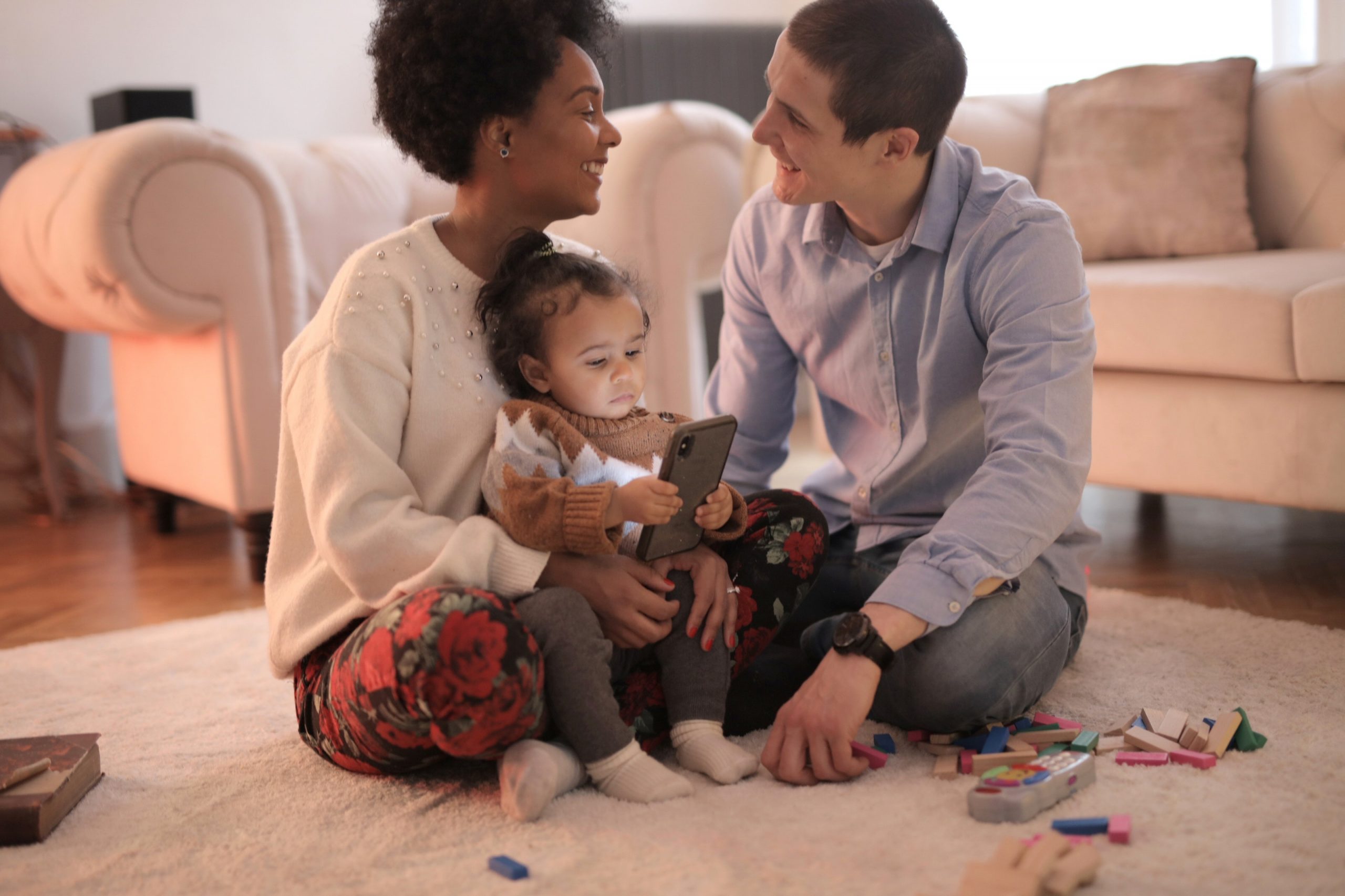
- When do babies start saying mama? Because your baby learns by watching you, try to be aware of what you’re doing around your baby. New skills can be discovered at any stage of your child’s development.
- Remember that each person is unique, with different talents and abilities, so instead of comparing him/her to other children, give him/her opportunities to improve his/her current skills.
- When do babies start saying mama? Parents can engage their children in a peek-a-boo game. If your baby isn’t talking yet, try talking to him/her and explaining what you’re doing. The more your baby hears around him or her, the sooner he or she will begin to speak.
- Recording your voice may be beneficial if you have difficulty speaking directly to your baby.
- Even if the baby does not make eye contact with you, he or she will notice when you smile or hold something interesting for him or her to look at.
- It is best to keep your baby close to you when reading with him or her. He/she will be able to see the pictures more clearly and begin forming an emotional bond with you, which is critical for his social development.
- Do not be disheartened if your youngster refuses to learn or communicate with you. Allowing him/her time to adjust to changes is one of the best things you can do.
- When do babies start saying mama? When your baby begins making noises or babbling, it may appear nonsense, but he or she will develop language skills in due course.
To end with
When do babies start saying mama? It is common for parents to be perplexed when their babies say mama and dada. It usually differs from one baby to the next because each child develops differently. However, you can anticipate them saying their first words around four. You must continue conversing with your baby and sing songs or poems to help them understand words and motivate them to speak. However, if your baby does not utter words or make sounds by a year, you should consult a doctor or a speech therapist.
Frequently asked questions on when do babies start saying mama
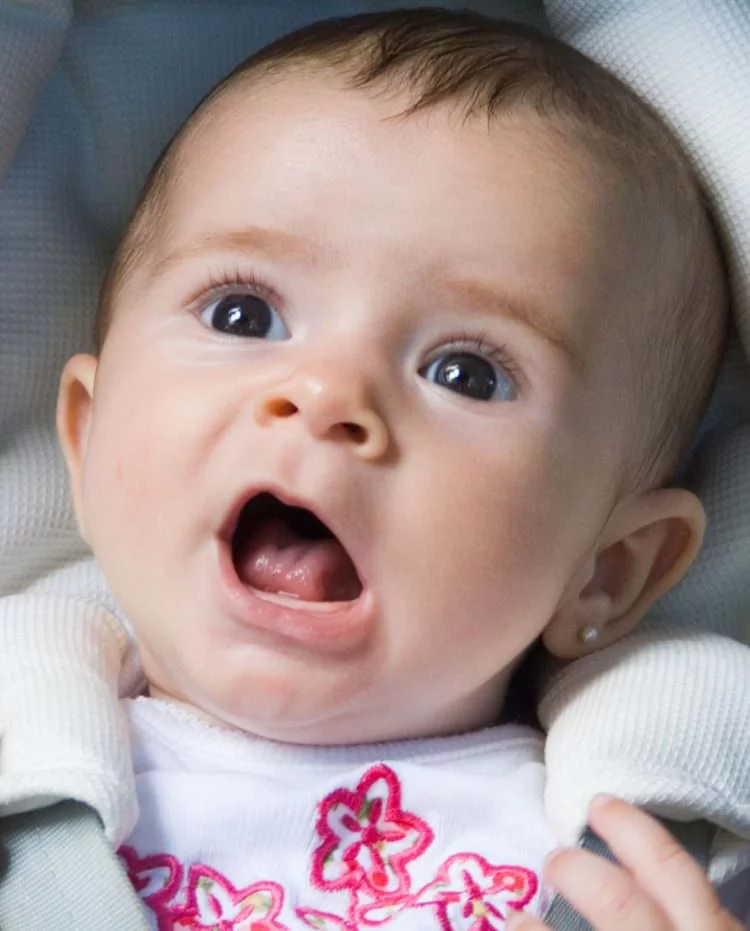
- Can a four-month-old baby say, mama?
Babies around four months old try their hardest to mimic sounds they hear from their parents or other people around them. It’s known as “baby babble.” They may respond to their parents’ chatter with “baby words.” Over the next few months, it may sound more like mamamama or dadadada, but at four months old, it’s unlikely they’ll be able to say mama properly.
- Can a six-month-old baby say, mama?
Babbling develops over time, and some babies can say mama and dada as early as six months, though seven to eight months is more typical. Around their first birthday, some babies can say “mama” and “dada” along with another word to form a mini sentence.
- Is it more common for babies to say mama or dada first?
Your child will grow at their own pace, which you cannot predict. Even siblings can disagree on who said what word first. Saying mama or dada first is often determined by which sounds your baby enjoys repeating the most – the “m” sound or the “d” sound – does not imply that they prefer one parent over the other!
- When do babies understand, say, mama?
Even when they get a word, they don’t always understand it. Your baby is unlikely to understand enough to connect what they try to say with what they direct the word at. So don’t be alarmed if they start using their new favorite word on everything. Mama or dada may be said to your pet or their food. Or to the mailman.
Around their first birthday, your child should be able to use mama and dada correctly for the appropriate person, possibly with another word – and may even have their own words for certain things. They count as words if they always use “dat” for bottle or “birrr” for bird.
- What are the tips for getting your baby to talk?
Keep talking if you want to encourage your child to talk! According to a study, babies who are spoken to, read to and sung to make those little brain connections that support language development can have better vocal skills as they grow up. Interactivity is essential because babies observe your face and mouth and learn to mimic it.

